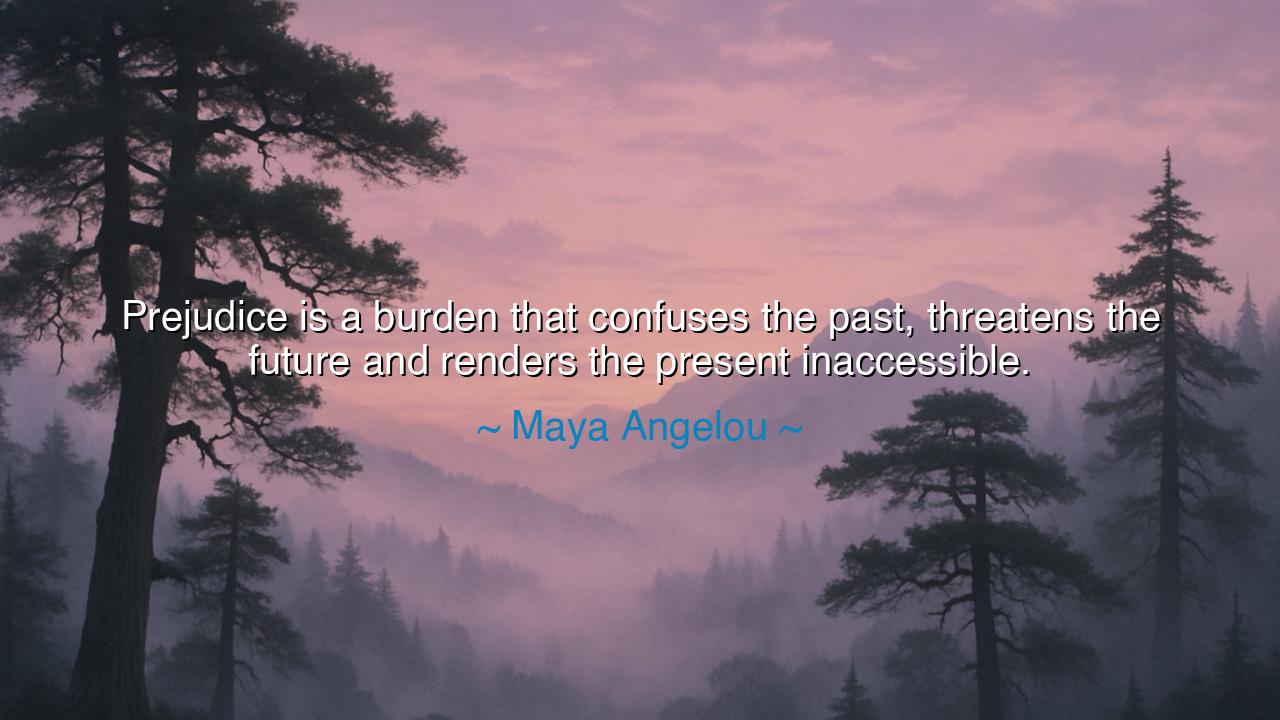
Prejudice is a burden that confuses the past, threatens the
Prejudice is a burden that confuses the past, threatens the future and renders the present inaccessible.






"Prejudice is a burden that confuses the past, threatens the future and renders the present inaccessible." These profound words spoken by Maya Angelou call upon us to confront the destructive force of prejudice, which clouds our understanding of the world and prevents us from seeing reality as it is. In Angelou’s vision, prejudice is not simply a bias or negative judgment about others—it is a burden that distorts our perception of the past, obstructs the possibilities of the future, and traps us in a present that is clouded by ignorance and division. By holding on to preconceived notions, we fail to recognize the truth of each moment and the potential for growth and unity.
The ancient Greeks understood the destructive power of prejudice and ignorance, though they often referred to it in terms of hubris and misguided judgment. In Sophocles’ Antigone, the heroine faces the wrath of her king, Creon, who is blinded by his rigid sense of duty and his refusal to see the true worth of human life beyond his narrow laws. His prejudice against her defies his capacity for empathy and wisdom, leading to ruin for both him and his family. This story, like Angelou’s quote, reveals how prejudice—whether born of pride, fear, or misunderstanding—can cloud our judgment, leading to the disintegration of both personal harmony and societal well-being. It shows that when we allow prejudice to shape our actions, we destroy not only our relationships but the potential for a better future.
In the same way, ancient Rome dealt with the tension between conservatism and progress. Julius Caesar, despite his rise to power and fame, was met with prejudice by many who saw his actions as an affront to tradition. Yet, it was precisely through his willingness to challenge old beliefs and his desire to unite people that he made significant strides in shaping Rome’s future. His eventual assassination, however, came as a result of prejudice—fueled by fear of change and a belief in his threat to the Roman Republic. The story of Caesar serves as a cautionary tale about the dangers of fear-driven prejudice that fails to see the potential for growth and unity in a changing world.
The power of prejudice in our world today can be seen in the persistence of racism, sexism, and classism—forces that continue to divide and restrict human potential. In the American Civil Rights Movement, Martin Luther King Jr. stood against the burden of prejudice that clouded the past and threatened the future of the nation. He saw how racism distorted history, reinforcing an unjust social structure, and he fought for a future where equality would reign. King’s vision of unity was grounded in his deep understanding that the future cannot be bright if it is built upon the weight of historical injustice and prejudice. His words, “I have a dream,” reflected not just hope for a future of justice, but the vision of a present free from the constraints of prejudiced thinking.
Angelou’s quote teaches us that prejudice is not just a personal affliction—it is a societal curse that prevents us from seeing each other clearly. The burden of prejudice does not only shape how we view others; it distorts our understanding of the past, fills the future with fear and misunderstanding, and leaves us unable to fully experience the present. Just as the prophet in ancient texts spoke of the importance of clear sight, so too does Angelou call on us to see without the veil of prejudice—to live with an openness and acceptance that allows us to embrace truth and create a world rooted in compassion.
In practical terms, we must strive to recognize the ways in which prejudice operates in our own lives. It may be subtle, creeping into our thoughts, conversations, and decisions without our full awareness. It may come in the form of fear, assumptions, or even unquestioned traditions. To break free from this burden, we must be willing to question our own biases and challenge the preconceived notions we hold about others. Like Socrates, who was known for questioning the very foundations of knowledge and belief, we too must question what we think we know and seek to understand the world through the eyes of others. Only then can we embrace the fullness of the present and step into a future that is not clouded by prejudice.
The lesson from Angelou’s wisdom is one of self-awareness and responsibility. As individuals, we must strive to dismantle the prejudices that hold us back—both in ourselves and in the world around us. By doing so, we open the door to a more just and compassionate world. The power to break free from the past and create a better future lies in our willingness to act with understanding, open-mindedness, and love. Let us not allow the burden of prejudice to cloud our judgment or steal our potential. Instead, let us embrace each moment with clarity, recognizing the power of the present to shape a brighter, more inclusive future.






AAdministratorAdministrator
Welcome, honored guests. Please leave a comment, we will respond soon